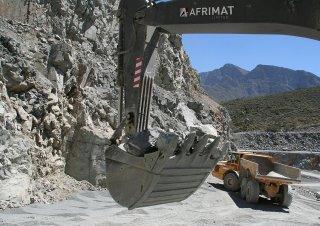
Sep. 17, 2010 - The aggregates and industrial minerals sectors currently have many opportunities for companies to take over other businesses and projects in order to grow their market share, says industrial minerals supplier Afrimat CEO Andries van Heerden.
Following the global recession, these industries are characterised by companies with weak balance sheets and debt, as well as decreasing margins and profits. This means that many companies are not in a good position to compete with other companies that do have favourable balance sheets, he explains.
"Given the economic context, this means that there is no place for complacency in our businesses and industries, but that there are many opportunities for acquisitions to grow market share," he says.
The construction industry, a staple of the aggregate industry, is also under stress this year, with the civil engineering sector turn-over declining by 40%. However, Afrimat's diversification has stood it in good stead, says Van Heerden.
"We broadened our strategy from a construction aggregate business to an industrial minerals business about 18 months ago, and used our opencast mining and crushing and screening knowledge to apply operational efficiency to all our acquisitions. This focus on implementing operational efficiency, which we aim to nurture and retain in future, has enabled our successful growth," he says.
As part of this efficiency drive, Afrimat is currently implementing initiatives to ensure that all the assets it has acquired over the past few years are properly integrated into the company, and that the assets have effective systems and processes to unlock maximum value, he adds.
Part of Afrimat's diversification included opening businesses in the Northern Cape and the Eastern Cape, which are showing excellent activity, and its KwaZulu-Natal, Mpumalanga and Limpopo provinces businesses are doing well, he says.
As previously reported, Afrimat acquired the Glen Douglas dolomite mine, at Henley on Klip, near Vereeniging, which will boost its dolomite capacity by 20%. Most of this product will be sold to steel producers in Gauteng, with agricultural lime being sold to regional farmers. Dolomite is a good aggregate for concrete because it has a low water absorption rate, and there is a good market in the south and south-west of Gauteng, and Afrimat believes that this market will also grow in the near future.
"The primary driver of growth in the aggregates and industrial minerals industries in the future will be the demand for industrial minerals, such as metallurgical dolomite, silica and limestone, and we are looking at related commodities that can be used in the metallurgical and glass-making industries. This means that we see ourselves growing in the industrial minerals market in the near future," says Van Heerden.
He also attributes the company's growth to good exposure to contracts throughout the country, including public and private contracts. Afrimat supplies structural aggregates for the Medupi power station construction works, and also supplies certain materials for the Kusile power station, as well as supplies materials to mining developments in the Northern Cape and in Namibia.
Another significant advantage is the company's mobile crushing, drilling and blasting experience. This enables Afrimat to access work in the road infrastructure sector, including building provincial roads, secondary roads, national roads and South African National Roads Agency Limited's large-scale projects.
"We are cautiously optimistic about the construction industry, despite its current state. "Power stations must be built, roads are still being upgraded and water infrastructure must be created. "Our civil sector exposure is good and we will continue to serve this market," he says.
The company is looking at industrial minerals opportunities elsewhere in Africa. Afrimat is also considering projects on railway development in Tanzania, Kenya and the East and Central African regions, where the aggregates, which it specialises in, can be used, Van Heerden concludes.





